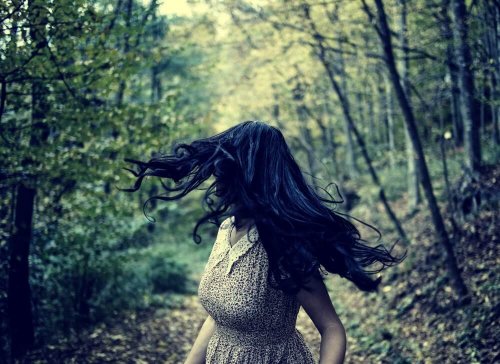(Exploring your Mind) Interestingly enough, empathic people usually like to experience fear. This may be because they have a greater ability to process emotions than other people; and therefore, seek to live more experiences of this type.
Related The Fear of Being Alone
by Staff Writer, April 16th, 2019
Scary movies continue to gain followers as time goes by. Haunted houses, survival zombies, and scary experiences overall are now more fashionable than ever. And yet, if someone were to ask us why we like to experience fear, we simply cannot explain it.
In fact, it’s quite confusing why we so many of us are fascinated by this kind of thing. It’d seem that our instinct should be to flee from everything that makes us feel bad, right? Then why do we like to feel fear?
Buy Book Keep Calm and Breathe
The truth is that it’s quite natural for scary things to fascinate us in some way. The mechanisms that cause this are, in fact, well documented by the scientific community. Understanding said mechanisms can help us better understand the way our mind works. In this article, we’ll be studying why this phenomenon takes place.
“But I love being scared. I think you’re brave only when you do things that scare you. I’ve always used fear as a motivator. I’m not sure why.”
-Ginnifer Goodwin-
We like to experience fear due to our brain functioning
According to various researchers, the reason we like to experience fear has to do with the way our mind works. When we’re facing a potentially dangerous stimulus, our body prepares to act. In these situations, we segregate certain hormones that make us enter the commonly known “fight or flight” state.
Thanks to this mechanism, our ancestors maximized their chances of survival in the face of all kinds of harmful situations. Substances such as adrenaline or norepinephrine (two of the neurotransmitters involved in fear responses) helped them escape from what could harm them. Even if they didn’t get the chance to escape, these substances for sure helped them cope with the situation.
Now, the problem with this mechanism is that it hasn’t really evolved in the last 10,000 years. Thus, the stimuli that we find today are quite different from those of the cave age. Despite this, however, our bodily response to them remains the same.
Buy Book The Tapping Solution: A Revolutionary System for Stress-Free Living (EFT)
The biggest difference in our way of reacting is our rational brain. And precisely, in this difference, we may find the reason why so many of us like to experience fear.

The existing disconnection between body and mind
Nowadays, when we’re in front of a stimulus that our body sees as dangerous, there’s an instant disconnection between what we think and what we feel.
On one hand, our hormonal system is activated as if we had to face a potentially harmful situation. On the other, however, in the case of a horror movie or a haunted house, our brain is perfectly aware that we’re not facing real danger.
“It’s like why people like to read scary books or go see scary movies. Because it creates a distance. They’re scared, but they’re not going to get hurt.”
-Vincent D’Onofrio-
Thus, contrary to what happened to our ancestors, we can enjoy this hormone-produced sensation without feeling actually scared. That way, we feel more active, full of energy, but without suffering the consequences of facing a real threat.
In fact, according to different pieces of research, fear-related hormones are very similar to those of happiness. Therefore, many people say that after a terrifying but safe experience, their mood improves significantly. So much so that looking for scary stimuli can become addictive for some.
Buy Book What Went Right: Reframe Your Thinking for a Happier Now
The relationship between personality and the taste for horror
Let’s get something straight. The hormones released in the face of a terrifying situation aren’t the only factor involved in this phenomenon. According to various investigations, not everyone likes fear equally. As a matter of fact, there are great individual differences depending on our personalities.
Thus, researchers have discovered that there are several traits that correlate with a greater attraction for scary situations. These are the main ones:
Openness to experience
Those who love doing different things every day tend to have a greater love for terrifying situations; to a point where they look to experience fear on a constant basis.
Extraversion
Extroverts need a higher level of external stimulation to feel at ease. That may explain why they usually like horror movies, haunted houses, and similar elements much more than introverts.
Empathy
Interestingly enough, empathic people usually like to experience fear. This may be because they have a greater ability to process emotions than other people; and therefore, seek to live more experiences of this type.

In this article, we mentioned several reasons that may explain why we like to experience fear. Keep in mind, though, that there may be many more factors involved. Science still has many questions to answer and many hypotheses to further investigate in this regard. That being said, it’s necessary to do more research on the subject.
Meanwhile, however, what’s clear is that people all around the world continue to enjoy more and more everything that may cause them an ‘artificial’ feeling of fear.
Stillness in the Storm Editor: Why did we post this?
Psychology is the study of the nature of mind. Philosophy is the use of that mind in life. Both are critically important to gain an understanding of as they are aspects of the self. All you do and experience will pass through these gateways of being. The preceding information provides an overview of this self-knowledge, offering points to consider that people often don’t take the time to contemplate. With the choice to gain self-awareness, one can begin to see how their being works. With the wisdom of self-awareness, one has the tools to master their being and life in general, bringing order to chaos through navigating the challenges with the capacity for right action.
– Justin
Not sure how to make sense of this? Want to learn how to discern like a pro? Read this essential guide to discernment, analysis of claims, and understanding the truth in a world of deception: 4 Key Steps of Discernment – Advanced Truth-Seeking Tools.
Stillness in the Storm Editor’s note: Did you find a spelling error or grammar mistake? Send an email to [email protected], with the error and suggested correction, along with the headline and url. Do you think this article needs an update? Or do you just have some feedback? Send us an email at [email protected]. Thank you for reading.
Source:
https://exploringyourmind.com/why-do-we-like-to-experience-fear/

Leave a Reply